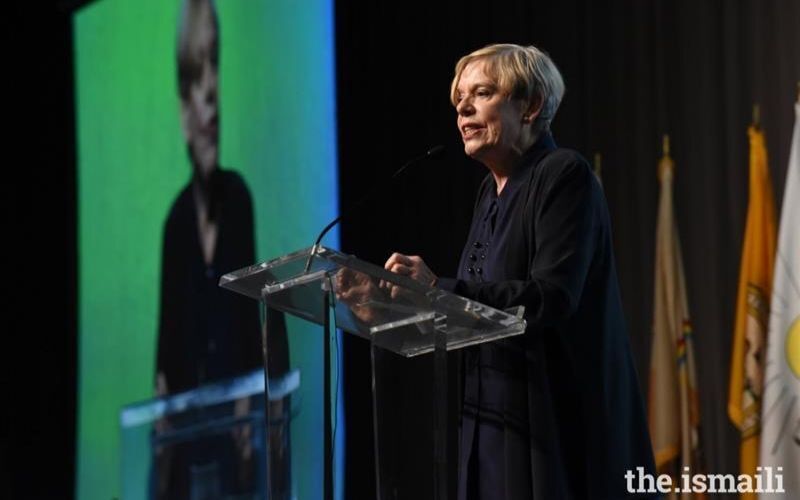Karen Armstrong writes for The Washington Post. When I heard that I won the TED prize, which gives you a wish for a better world, I knew almost immediately what I wanted. I knew immediately because as a historian of religion it has long been a frustration to me that the major religions have all got this central ethic of concern for everybody – this Golden Rule— and all say it’s the heart of their faith.

Yet when it comes to participating with one of the chief tasks of our time – building a global community where people of all persuasions can live together in respect – these faiths were looked on as more of a problem than a solution.
So I asked TED to help me create, propagate and sustain a Charter for Compassion. The charter was written by leading thinkers of six of the major religions demonstrating that, despite our manifest divisions, this was one policy that we could all agree upon.
When the Charter for Compassion was unveiled in November 2009, I knew that if we wanted to make compassion a positive force in our tragically polarized world, somehow we had to translate the charter, which is primarily a call to action, into practical, sustainable, creative, and realistic endeavors.
Now, in 2012, more than 85,000 people have signed the Charter and we have 150 partners worldwide. But by far the most compelling stories are those of compassion “on the ground”.
One of the most vibrant projects is our compassionate cities campaign. Being a compassionate city certainly doesn’t mean that you are compassionate already. It means that you are putting compassion on your radar screen. It means you are going to try to integrate the golden rule and the compassionate ethic into the gritty reality of city life.
Seattle led the way in 2010 with a detailed ten-year plan. At the moment there are over 70 cities worldwide going through this process – from Cairo, Egypt to Toledo, Ohio. Recently Louisville, Kentucky, right in the middle of America, declared itself a compassionate city with great enthusiasm. Louisville’s mayor is determined to set a world record for compassionate acts during his “week of service” this April’s Derby.
Pakistan is at the forefront of worldwide efforts. I cannot describe the enthusiasm and commitment for the charter in this country right on the front lines so many of the conflicts that are tearing our world apart. Just one of the many extraordinary things they have done is to introduce a compassionate character into the Pakistani Sesame Street, Sim Sim Harama. The character will become a role model for preschoolers.
Pakistan is working closely with Jordan, on the other side of the Gulf, in education efforts. There are a dozen of certified compassionate schools in Pakistan and Jordan, including a tent school that follows nomads through the Jordanian desert. The two charter groups plan to expand the number to 5000 within six years.
Pakistan and Jordan are also in the forefront of our efforts to rescue compassion from the junk room of our minds and put it right back in the center of our consciousness. During Ramadan, Jordan and Pakistan had a competition on the Web where they invited people to post up a compassionate action every day. There would be prizes for the most imaginative acts – compassionate prizes, not a mobile phone or an IPad – but a cataract operation for someone in need. We didn’t think there would be more than 10,000 participants, but 40,000 people took part all through Ramadan. Next year they plan to expand to Saudi Arabia, Lebanon, Iraq, Iran.
In Holland the charter has been translated into a guide for medical ethics. The young Dutch medical student that came to see me about this said: “You know we doctors we go into medicine because we want to help people but somehow in the course of our training that gets knocked out of us. Let’s put it right back in.” Now an international group of medical students is working toward setting new education standards for compassionate training in medical school and will host a major international conference on the subject this November.
As I continue to work to expand the charter’s reach, I find that the people most receptive have been businesspeople. In Pakistan, Seattle and Davos – I have had fruitful discussions about how we can make compassion an accepted and necessary practice in our modern economy. These new connections will empower the movement for years to come.
By nature, I am and remain a contemplative, but the charter has pulled me out of my study and made me an activist.
I am convinced that the only way to achieve a peaceful, just and sustainable world is to implement the Golden Rule globally, treating all people - whatever their ethnicity or ideology - as we would wish to be treated ourselves. If we want a viable world, we all have to become activists in our particular field.
But my study, solitude and writing remain crucial; they feed me, prevent me from becoming superficial and give me what others find in prayer or an intimate or family relationship’.
Ultimately, the choice is ours. We can either emphasize those aspects of our traditions that are dismissive, cruel and intolerant of others or we can look to our traditions – religious or secular -- for those traditions that speak of compassion, empathy and respect. We know what will happen if we don’t choose the later. Compassion is not an option; it’s a key to our survival.

